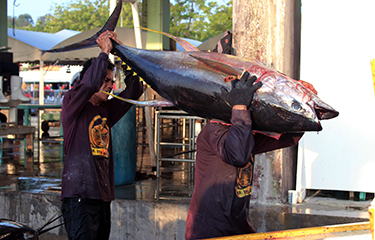Philippine Tuna Handline Partnership (PTHP) has kicked off the process to apply for the Marine Stewardship Council (MSC) ecolabel.
The application has entered MSC full assessment. A site visit will be conducted in December before the assesor makes a final decision on the application, possibly in July next year.
PTHP operates within the Philippine small-scale yellowfin tuna handline fishery. Its members fish yellowfin tuna, a major fishery export item of the Philippines.
“After a long journey making improvements in their fishery, we’re pleased to see this small-scale tuna fishery reach MSC full assessment where it will be independently assessed by auditors against our rigorous sustainability standard,” MSC’s Senior Fisheries Outreach Manager on Tuna Bill Holden told SeafoodSource.
PTHP will be the first small-scale fishery group in the country to earn the MSC ecolabel if its application is successful. So far only industrial, commercial fishing, and processing companies could afford to obtain the MSC ecolabel due to costly evaluation process and maintenance of its requirements, according to BusinessMirror.
The Philippine organization could do so because for nearly a decade, it has been supported by World Wide Fund for Nature (WWF) Philippines’ Partnership Program Towards Sustainable Tuna (PPTST) to meet strict requirements of the MSC ecolabel. The project has received assistance from several WWF national offices in Germany, Switzerland, Netherlands, United Kingdom, and other local and international partners.
“This is an incredible opportunity for our small-scale fishers. In an industry that is dominated by big commercial interests our fishers are making stand for themselves by telling the world that there is, indeed, space for small-scale, sustainably sourced seafood,” WWF-Philippines Project Manager Joann Binondo told BusinessMirror.
With the MSC ecolabel, small-scale tuna fishers will have better chances to sell their products to developed markets, which are increasingly in need of sustainably-sourced seafood.
“This isn’t just about the ecolabel. This is about our fishers choosing sustainability, something that they did of their own accord. That is part of the message we want people to see – that our fishers are capable, and their seafood is the best,” Binondo said.
Small-scale handline fishing can be a sustainable solution to solve overfishing issues as its gear is considered as more environmentally friendly than other fishing gears, BusinessMirror reported.
Photo courtesy of Primie Villa Parcon/Shutterstock







